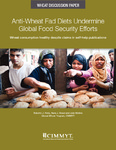Mostrar el registro sencillo del ítem
Anti-wheat fad diets undermine global food security efforts: wheat consumption healthy despite claims in self-help publications
| Autor: | Peña-Bautista, R.J. |
| Autor: | Braun, H.J. |
| Autor: | Mollins, J. |
| Año: | 2014 |
| URI: | http://hdl.handle.net/10883/4138 |
| Resumen: | A recent review paper released by Britain’s University of Warwick (Lillywhite and Sarrouy 2014) addresses two fundamental questions regarding wheat: “Are whole grain products good for health?”; and “What is behind the rise in popularity of glutenand wheat-free diets?” The paper was commissioned by cereal-maker Weetabix to address reports in the news media that wheat products are the cause of health problems, resulting in an increasing number of consumers switching to low-carbohydrate grain- and wheat- free diets. For many health professionals this is a worrying trend because wheat not only supplies 20 percent of the world’s food calories and protein, but has important benefits beyond nutrition, the authors state. The Warwick paper provides a scientific assessment of the benefits of whole grain consumption, information that the authors note seems to have been lost in media headlines and the reporting of “pseudo-science.” The paper concludes that whole grain products are good for human health, apart from the 1 percent of the population who suffer from celiac disease and another 1 percent who suffer from sensitivity to wheat (Lillywhite and Sarrouy 2014). Eating wholegrain wheat products is positive, improves health and can help maintain a healthy body weight, the authors report. Scientific evidence regarding wheat- and carbohydrate-free diets is thin and selectively used, they state, and a low cereal and carbohydrate diet “may cost more but deliver less.” Additionally, an economically viable industry has developed around so-called “free-from” diets and may be persuading consumers to switch from staple foods to specialist foods created especially for those who need to avoid gluten, a protein found in wheat and other grains, they add. This Wheat Discussion Paper serves as a foundation upon which the authors hope further conversation will develop. It aims to highlight unsubstantiated nutritional claims about wheat and shine a spotlight on the important role of wheat and fiber in human diets. It also seeks to encourage discussion about how non-scientific claims about wheat could affect poor consumers and global food security. |
| Formato: | |
| Lenguaje: | English |
| Editor: | CIMMYT |
| Nombre de la Serie: | Wheat Discussion Paper |
| Copyright: | CIMMYT manages Intellectual Assets as International Public Goods. The user is free to download, print, store and share this work. In case you want to translate or create any other derivative work and share or distribute such translation/derivative work, please contact CIMMYT-Knowledge-Center@cgiar.org indicating the work you want to use and the kind of use you intend; CIMMYT will contact you with the suitable license for that purpose. |
| Tipo: | Book |
| País de enfoque: | Mexico |
| Lugar de publicación: | Mexico |
| Páginas: | iv, 16 pages |
| Agrovoc: | WHEAT |
| Agrovoc: | HEALTH |
| Agrovoc: | DIETS |
| Agrovoc: | GLUTEN |
| Agrovoc: | HUMAN DISEASES |
Ficheros en el ítem
Este ítem aparece en la(s) siguiente(s) colección(ones)
-
Wheat
Wheat - breeding, phytopathology, physiology, quality, biotech

